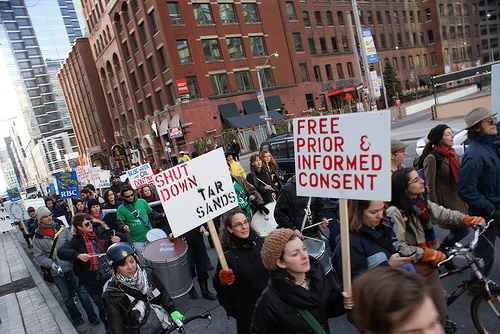On March 2, more than 170 people rallied outside of the Royal Bank of Canada’s (RBC’s) Annual General Shareholder meeting (AGM) in Toronto after a series of creative non-violent actions all morning. Inside, First Nations Chiefs and community representatives from four different Nations demanded RBC phase out of its Tar Sands financing and to recognize the right to Free, Prior and Informed Consent for Indigenous communities. Afterward, Indigenous leaders lead the crowd in a march to rally outside both RBC Headquarters buildings.
Other cities across Canada supported the First Nations voices inside the AGM as well with solidarity actions from (click on a city for pictures) London, Calgary, Vancouver, Edmonton, Victoria and more. Check out photos from those and our events in Toronto.

And see some preliminary media coverage from the Wall Street Journal, Yahoo, the Edmonton Journal and the Dominion.
Since 2007 RBC has backed more than $16.7 billion (USD) in loans to companies operating in the tar sands-more than any other bank. Called, ‘the most destructive project on Earth,’ Alberta’s tar sands projects will eventually transform a Boreal forest the size of England into an industrial sacrifice zone complete with lakes full of toxic waste and man-made volcanoes spewing out clouds of global warming emissions.
Outside the shareholder meeting school children, bank customers of every age, First Nations community representatives joined Rainforest Action Network, Indigenous Environmental Network, No One Is Illegal and Council of Canadians made their outrage at RBC’s investments heard — to the thumping beats of street Samba band, the crowd shouted “Cultural Genocide: who do we thank? Dirty investments from Royal Bank!”
Inside the shareholder meeting, Chief Al Lameman of Beaver Lake First Nation, Alberta,Vice Chief Terry Teegee of the Carrier Sekani Tribal Council of BC, Hereditary Chief Warner Naziel of the Wet’suwe’ten First Nation of BC, and Gitz Crazyboy of Athabasca Chipewyan First Nation addressed RBC CEO Gordon Nixon directly about the way tar sands extraction projects have jeopardized their health and their rights.
Downstream communities have experienced polluted water, water reductions in rivers and aquifers, declines in wildlife populations such as moose and muskrat, and significant declines in fish populations. Tar sands has all but destroyed the traditional livelihood of First Nations in the northern Athabasca watershed.
RBC is clearly feeling the public pressure over their tar sands financing. They spent half their shareholder meeting addressing the issue. Recently, the bank convened a high-level meeting with more than a dozen international banks for a ‘day of learning’ about the reputational risks associated with the tar sands. In addition, according to information the bank provided to RAN during a February meeting in San Francisco, RBC is currently evaluating new lending criteria that would apply to the oil and gas sector, in particular to the tar sands. However, the bank has been reticent to include Free, Prior and Informed Consent in its policy, which would ensure that First Nations communities are respected in lending practices.
“RBC’s significant financial relationship with companies pursuing tar sands development activities within our traditional territory and without consent warrants close attention,” said Chief Al Lameman of Beaver Lake First Nation. “RBC should update their policies to include a recognition of Free, Prior and Informed consent for Indigenous communities; this globally recognized concept was adopted by TD Bank Financial Group in 2007 and is endorsed by Indigenous communities across the political spectrum.”

Internationally, tar sands financing is gaining tremendous negative attention. An increasingly vocal group of shareholders and environmentalists turned last month’s BP, Shell and Royal Bank of Scotland annual meetings into a referendum on the oil extraction projects.
This week’s marches, rallies and actions were a triumphant roar of grassroots power from across the spectrum. The day concluded with an apt chant to RBC Headquarters, foreshadowing the growing flame of tar sands resistance across Canada, “Native communities under attack! We won’t stop until you act!”



